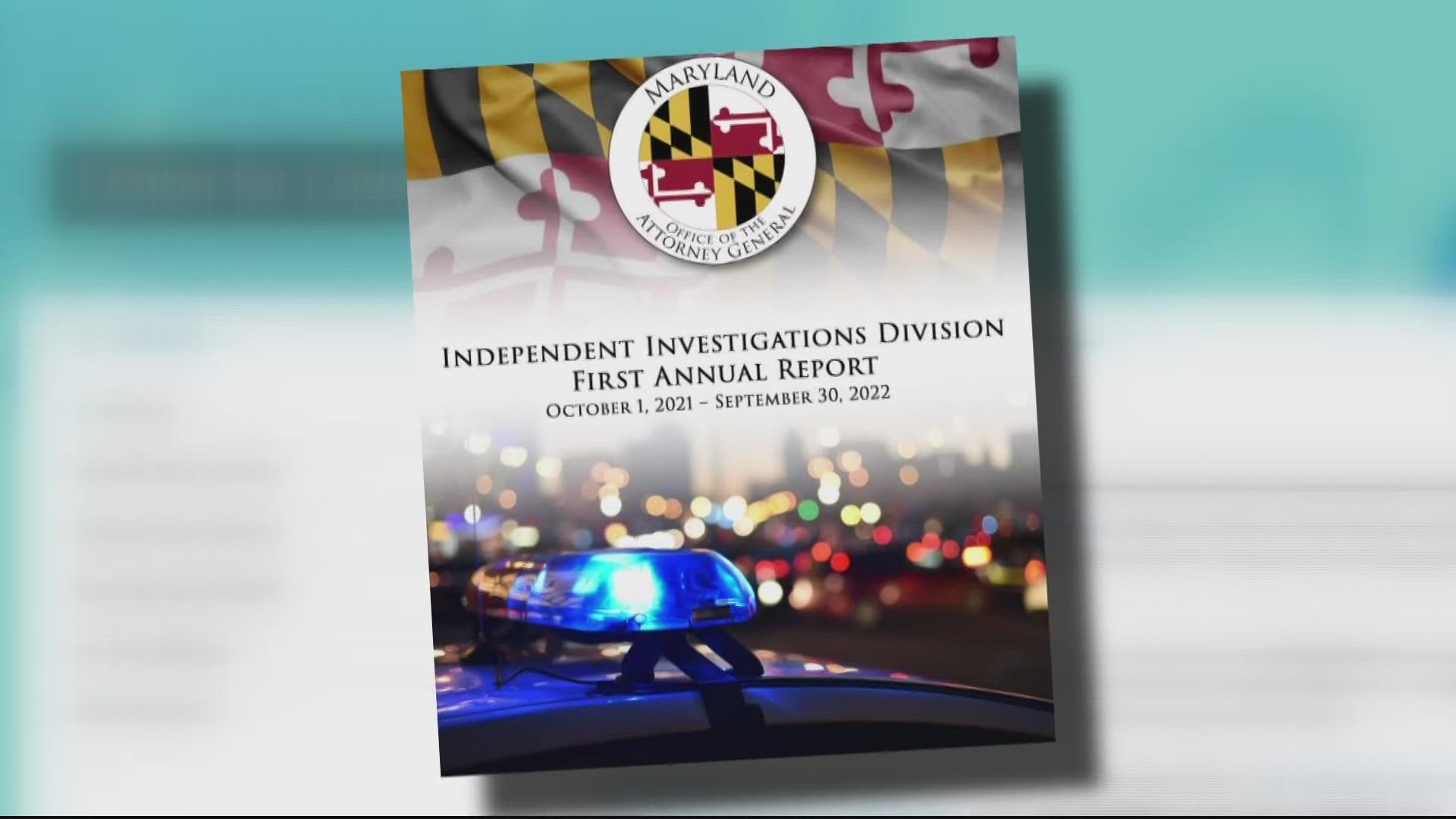MARYLAND, USA — Maryland's Attorney General's Office released their first report by the Independent Investigations Division (IID), a new department developed in 2021 by police reform legislation to investigate police-involved fatalities in the state. The first annual report concluded that 23 people died after police encounters in the state, and none of the officers involved were charged with wrongdoing.
Legislation passed in March 2021 ensured that moving forward, police agencies involved in fatal interactions with the public would not be the ones in charge of investigating those deaths. Instead, IID would handle all investigations.
"For the first time, Marylanders who died at the hands of police would not have their deaths investigated by the same police agency that employed those officers," Maryland Attorney General Brian Frosh wrote. "It was a true step toward impartiality and fairness."
The 48-page report looks into incidents that happened from Oct. 1, 2021, through Sept. 30, 2022, which includes a total of 23 investigations. Fourteen of the people killed (61%) were Black, and 84% of the officers involved were white.
IID and Maryland State Police officials responded to the scenes in 21 of the 23 incidents. In each of the two remaining incidents, the person died two days after their interaction with police, at which point the IID assumed control of the investigation. According to the report, for the 21 cases, IID and MSP responded to the scene within an average time of one hour and 14 minutes from notification.
Additionally, 11 cases included an on-scene response from MSP’s Forensic Sciences Division, which is tasked with collecting and later analyzing physical evidence. As part of its case work, the division test-fired 34 firearms across all IID cases, which included guns recovered from the person that died and used by involved officers.
The investigation breaks down each incident based on several categories including location, time of day, law enforcement agency, demographics of the involved officer, as well as the demographics of the person who died, including their gender and race, and incident type to list a few factors.
Of the 23 cases, 13 were described as fatal shootings, seven were deadly vehicle incidents, and three were in-custody deaths.
According to the report, the cases that involve fatal vehicle incidents include:
- Pursuits by police where an individual in the vehicle being pursued by police died;
- Pursuits by police where the vehicle being pursued struck an unrelated vehicle and an individual in that unrelated vehicle died;
- Traffic incidents involving a police officer and another individual where that individual died.
In the incidents that did not involve a police chase or vehicle crash, the report states that seven individuals brandished a firearm before being shot by police. Three people were armed with a knife. Five people were unarmed, three of which were in police custody at the time and died after a medical emergency or drug overdose.
In the remaining case, a man implied that he had a weapon and was holding a medical walking cane just before being shot.
The IID report also considered alcohol and drug intoxication as well as mental illness. In the report, 10 cases were found to be related to drug or alcohol intoxication, while seven were unrelated, and six remain unknown. Eighteen were related to mental illness, which the report states it had to be linked to the person before the death and that it appeared to play a role in their behavior while interacting with officers.
When breaking down location of locations of these officer-involved incidents, four happened in both Baltimore City and Baltimore County, three happened in Anne Arundel County and Montgomery County, while two happened in Charles and Prince George's counties. One incident was reported in Frederick, Harford, Queen Anne's, Somerset, and Wicomico counties, according to the IID.
None of the officers involved in the 23 investigations have been charged, which the president of Maryland's Fraternal Order of Police, Clyde Boatwright, says is independent proof officers are overwhelmingly justified in the use of deadly force. But Willie Flowers, the president of Maryland's NAACP, called the number of black people being killed “alarming.”
"We're not there yet," says Heather Warnken, the executive director of the University of Baltimore School of Law’s Center for Criminal Justice Reform.
Warnken added that Maryland’s attorney general is responsible only for independently investigating deaths, but the decision whether or not to prosecute police remains with local authorities.
“I think it's worth really underscoring the inherent conflict of interest in that decision lying in the hands of a state's attorney's office that works so closely and collaboratively every day with that very police department.”
State Senator Will Smith (D- Montgomery County) said he’s drawn up legislation to the put the power to prosecute police in the hands of the state’s attorney general. The general assembly meets for its 2023 session beginning Jan. 11.

